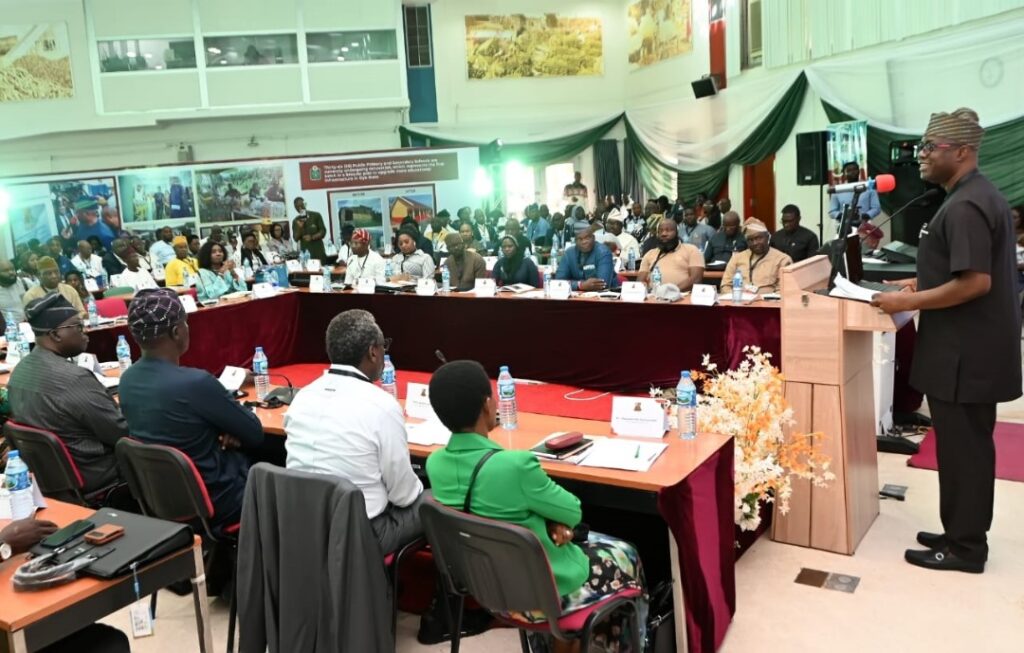
Sony was already a global brand before it introduced the Walkman on July 1, 1979. The device, which allowed people to enjoy their favorite music anytime and anywhere, revolutionized the electronics industry and sold over 400 million units.
The Walkman came to life at the request of Sony co-founder, Masaru Ibuka, who wanted something more portable than the Sony TC-D5 for long flights. Engineer Norio Ohga, using the Sony Pressman as a base, delivered on that request. Thus, a game-changer was born. But instead of building on that achievement, Sony basked in its glory. By the time it returned to innovation, Apple had launched the iPod, building on the Walkman’s foundation. That became known as the Sony slip—a costly pause in progress.
Despite its continuing presence, Sony is no longer a front-runner in an industry it once led. Complacency is always costly.
In contrast, Governor ‘Seyi Makinde of Oyo State refuses to tread the same path.
Armed with two strategic blueprints—the Roadmap for Accelerated Development 2019–2023 and the Roadmap for Sustainable Development 2023–2027—Makinde has steered Oyo State through unprecedented development.

He has constructed more kilometers of roads than any previous governor. He has employed more civil and public servants than all his predecessors. He has pushed agribusiness further than any other governor in Nigeria. He has renovated more schools since 1999. He has appointed more permanent secretaries than ever before. He has provided more funding for security agencies. He has championed inclusivity in governance. He has reduced dependence on FAAC allocation. He has put Oyo on the world stage through his pioneering domestication of the AfCFTA. He has attracted record investments. He has supported primary healthcare like never before. He has established new institutions and agencies. He has revitalized urban renewal. He has achieved independent power generation, a first in the state’s history.
Makinde’s philosophy of leadership as service is evident in every action. And while applause echoes across the zones, cities, and villages of Oyo, he insists he’s not driven by ovation but by impact.
Unlike Sony, which lost its edge after a great leap, Makinde keeps pushing forward. For him, complacency is a sacrilege; slowing down is a sin.
At the recent Omituntun 2.0 Mid-Term Leadership Retreat held at the International Institute of Tropical Agriculture (IITA), Ibadan, Makinde spoke on the theme “Reflecting on Omituntun 2.0: Towards Building an Enduring Legacy.”
He addressed cabinet members, heads of departments and agencies, and permanent secretaries: “Have we made progress? Yes. Are we where we need to be? Not yet.”
He highlighted that while the administration had recorded significant progress, some projects needed urgent final pushes: critical road and transport infrastructure are behind schedule; agribusiness hubs in Eruwa, Akufo, and Ijaiye are incomplete; solid minerals development is only beginning; IGR, though improving, hasn’t reached desired monthly targets.
“These are not failures,” Makinde said, “They are reminders that great visions demand deliberate coordination.”
To finish strong, he emphasized inter-ministerial collaboration. No single ministry can build a legacy alone. He stressed that the last stretch of his tenure should not focus on starting new projects, but completing existing ones. Institutional wins must be consolidated, and all arms of government must work in alignment.
To operationalize this, the governor proposed an Oyo State Delivery Taskforce and a monthly review system among ministries to resolve issues proactively. He also proposed a public-facing Legacy Dashboard, modeled after Rwanda’s Imihigo Delivery Compact, to track deliverables and promote accountability. In addition, he announced quarterly inter-ministerial retreats, focused on co-delivering outcomes rather than merely reporting activities.
Each Ministry, Department, and Agency (MDA) will identify 3–5 S.M.A.R.T. legacy deliverables to be completed by May 2027, with mid-point targets set for January 2026. These deliverables will be published as each MDA’s Oyo Legacy Pledge.
Makinde emphasized collaboration across MDAs, especially where mandates overlap—like infrastructure and commerce, education and youth, tourism and environment.
“These compacts will be monitored quarterly and reviewed at our Legacy Retreat in 2026,” he said. “They will guide resourcing, visibility, and decision-making. This is not a slogan. It is a covenant—a pact between us and the people.”
To build a legacy that outlives his administration, the governor listed four critical steps: completion must be prioritized—finishing agribusiness hubs, the airport, PHC upgrades, and feeder roads. Effective policies must be institutionalized through legal frameworks and performance-linked budgeting. The process, not just the product, must be made transparent and replicable. And successors must be empowered, not sabotaged—because a true legacy outlives its architects.
Makinde concluded with a resounding charge: “A legacy is not what you start. It is what you finish — and finish well. Let posterity say of this government: They came, they saw the gaps… and they closed them.”
At a time when many second-term governors are scheming for political survival, Makinde is focused on legacy, compacting his pact with the people, and doubling down on impactful governance.
As Mr. Ayodele Ogundele, CEO of Davies Hotel, Ibadan, remarked: “I have never seen a second-term governor working as conscientiously as Makinde is doing.”
The best gift a people can receive is a leader who genuinely cares about their welfare and works tirelessly to improve it.
Makinde is not just leading Oyo State—he’s setting a new gold standard for governance in Nigeria.
●Dr. Sulaimon Olanrewaju is the Chief Press Secretary to the Oyo State Governor.








